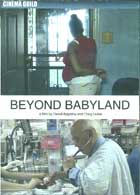
Beyond Babyland 2010
Distributed by Cinema Guild, 115 West 30th Street, Suite 800, New York, NY 10001; 212-685-6242
Produced by Craig Leake and David Appleby
Directed by Craig Leake and David Appleby
DVD, color, 55 min.
Sr. High - Adult
Health Sciences, Social Work, Sociology, Psychology
Date Entered: 11/12/2010
Reviewed by Lori Widzinski, Health Sciences Library, University at Buffalo, State University of New YorkBabyland is the moniker for the county graveyard near Memphis, Tennessee. Each year hundreds of babies are laid to rest here before their first birthday because their families cannot afford any other type of burial. Arranged in a sort of organized mass grave, the tiny caskets are laid side by side and marked on the surface with a metal disk bearing a number, not a name. Beyond Babyland explores the reasons why Memphis has the highest infant mortality rate in the U.S., and what some people are doing to help change that statistic.
Dr. Sheldon Korones founded the Newborn Center that bears his name at the Regional Medical Center in Memphis more than 40 years ago. His desire to try to reverse the cycle of infant mortality has made this the primary place in the aea to help premature and high risk infants. Dr. Korones speaks with forthrightness and eloquence on the reasons that Memphis, and the United States in general, have such high rates of infant mortality. Is it race-related? Yes. Is it politically related? Yes. Is it a financial problem? Yes. As Dr. Korones states, “Infant mortality is a manifestation of accumulated social inadequacies that we have tolerated.”
Another agency profiled in the film is the Hope Presbyterian Church. Members of this congregation have created an “oasis of hope” house in the middle of the poverty stricken neighborhoods where the highest rates of infant mortality, morbidity and teen pregnancy occur. Following several of the young women and their families as well as the mentors from Hope Presbyterian, the film illustrates the stark reality of life for those caught in the cycle of “social inadequacies.”
Beyond Babyland is not an unbiased film, but it does bring to light a huge national blemish. Expertly filmed and edited, it has received airplay on several public television stations in the U.S. College and university faculty teaching about the health care crisis, socioeconomic and sociopolitical issues, and race relations may want to consider this film. It will be a welcome addition to library collections supporting all the health sciences, social work, sociology and psychology. Recommended.